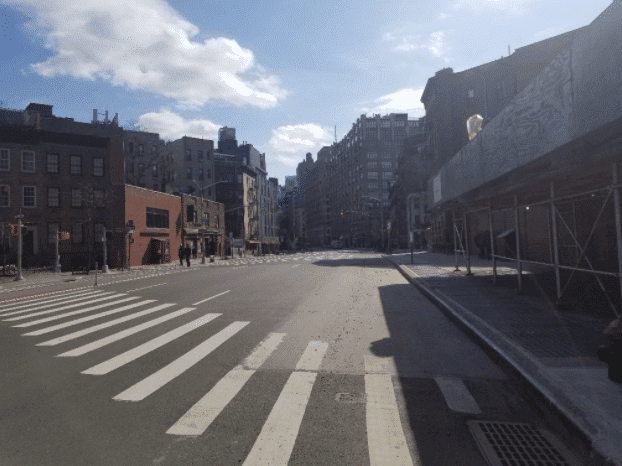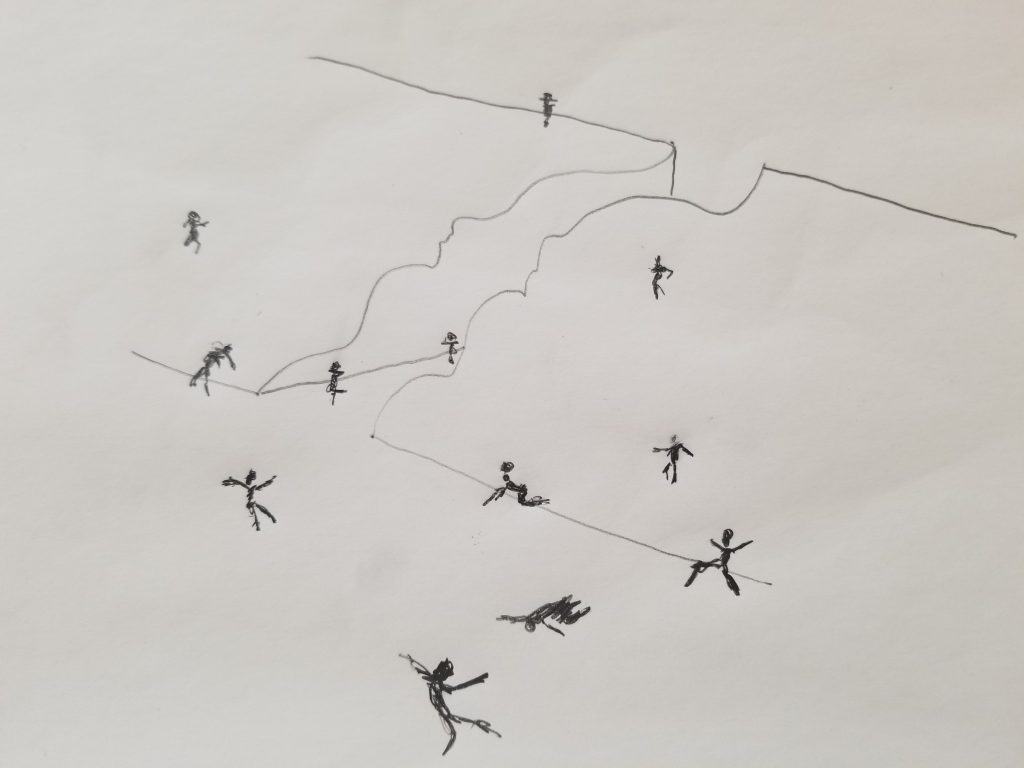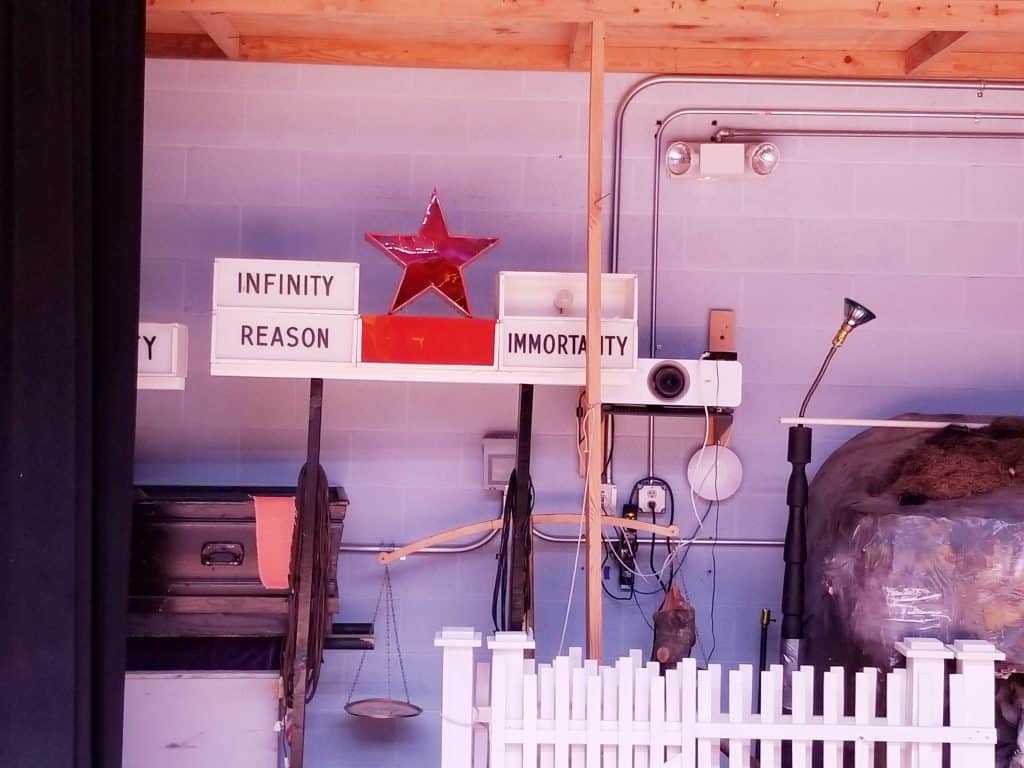
A Special Message from David Byrne.
The pandemic is revealing the many ways our lives intersect. Is this an opportunity for us to reimagine what we can be?
I went for a long bike ride today. I needed to get out and clear my head. The sun was shining, daffodils were emerging along the riverside bike path, dogwood trees were in bloom and at one point I thought to myself, “Yeah, life goes on.”
Pretty corny, and maybe even a bit selfish given what so many people are going through right now. But maintaining the basic rhythms of life that remain available can give one a sense of resilience.
I ask myself, is there something we can learn from this, something that will prepare us to better weather the next crisis, some different way of being that might make us stronger? Is this an opportunity to change our thinking, our behavior? How can we even do that? Are we capable of doing that?

It’s ironic that as the pandemic forces us into our separate corners, it’s also showing us how intricately we are all connected. It’s revealing the many ways that our lives intersect almost without our noticing. And it’s showing us just how tenuous our existence becomes when we try to abandon those connections and distance from one another. Health care, housing, race, inequality, the climate — we’re all in the same leaky boat.
Viruses don’t respect borders. They get in even with extra screening and travel restrictions. Maybe less, but some slips in. And until there is a vaccine, no one is immune. What that means is that we have to put aside some of our suspicions and animosities towards others and see how much we can limit or even halt the damage.
One hopes that smart analyses and initiatives will help us discover how to do that. We at Reasons to Be Cheerful like to look around and see who has already found success in solving a problem. A few places like South Korea, Taiwan and Singapore have done a good job with containing this thing — kids are in school, people are going to work, cafes and restaurants are full. In many European countries, governments are making sure folks still have an income. Gingerly, these people’s worlds and economies are returning to normal — a somewhat new normal.

What can we learn from their success? For one, many of these countries didn’t hesitate. They began testing as many people as possible almost as soon as the virus appeared. Many of them tested even those who didn’t show symptoms. If someone tested positive they were quarantined, and using GPS and phone data the people they had recent physical contact with were found and isolated as well. Meanwhile, other folks went about their lives while submitting to screenings like mandatory temperature checks before entering public spaces.
In these places there were sometimes lockdowns and town-wide quarantines, but not for very long. Vò, the Italian city that had that country’s first coronavirus death, did something remarkable. According to the Guardian, absolutely everyone in town was tested — 89 of the tests came back positive. Then, after a nine-day period of town-wide isolation, another series of tests was conducted. Six people tested positive that time, and those people continued to be isolated, while others went back to their lives. Workplaces reopened, kids returned to school. Life has come back. Folks can pay their bills.
Vo’s intervention worked, but there was a price. Freedoms were curtailed, as they have been, to some degree, in virtually every place that has contained the virus. Authorities have used surveillance cameras and contact-tracking teams to locate the recent contacts of the infected. In places like Taiwan, South Korea, Singapore and Vò, folks have shown a willingness to share information with the government, make personal sacrifices and do what is necessary for the greater good.
My phone, which is satellite-tracked by the Taiwan gov to enforce quarantine, ran out of battery at 7:30 AM. By 8:15, four different units called me. By 8:20, the police were knocking at my door.
Some might find the measures taken to halt the spread of the infection to be intrusive. But the outcome they led to — THAT is freedom. To be able to return to one’s life, with a job, healthy and safe — THAT is national security. If those places can do it, why can’t the rest of us? And what kind of change in our thinking would it take?
Nothing is normal anymore
There are different kinds of freedoms. When you’re stuck in your house, as I am, you’re not free, that’s for sure. If you’ve been laid off you’re not exactly free, either. How much do we surrender our rights and freedoms as individuals in order to better the health, safety, economic security and well being of everyone, including ourselves? Are we a bucket of crabs or a community?
We have changed our behavior before. Ignaz Semmelweis was mocked when, in the mid-19th century, he said that doctors washing their hands before working with patients could save lives. After his death, other germ theorists like Louis Pasteur and Joseph Lister showed how correct he was, and the procedure was adopted. Doctors, and all of us, made this change willingly, without coercion. It became a social norm.

What is happening now is an opportunity to learn how to change our behavior. For many of us, our belief in the value of the collective good has eroded in recent decades. But in an emergency that can change quickly. During the Great Depression, new policies to protect the public were introduced. It was accepted that these were necessary to stabilize society and get life back on track.
In emergencies, citizens can suddenly cooperate and collaborate. Change can happen. We’re going to need to work together as the effects of climate change ramp up. In order for capitalism to survive in any form, we will have to be a little more socialist. Here is an opportunity for us to see things differently — to see that we really are all connected — and adjust our behavior accordingly.
Are we willing to do this? Is this moment an opportunity to see how truly interdependent we all are? To live in a world that is different and better than the one we live in now? We might be too far down the road to test every asymptomatic person, but a change in our mindsets, in how we view our neighbors, could lay the groundwork for the collective action we’ll need to deal with other global crises. The time to see how connected we all are is now.


